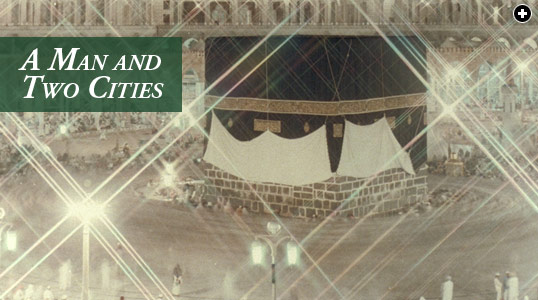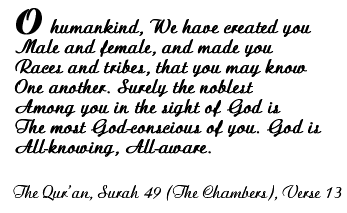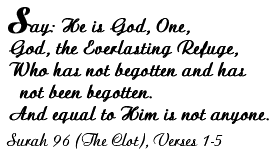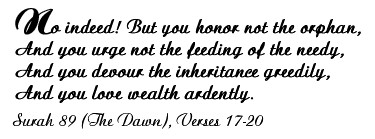
Written by Ismail Ibrahim Nawwab
 t started as a story of a man and two cities. Incredibly, the experiences of one illiterate inhabitant of "an uncultivable valley" in Arabia, more than 13 centuries ago, shaped the world we live in today. Within the space of one generation, that man introduced changes that affected all facets of the contemporary daily life of one sixth of humanity: its religious, political, cultural, legal, social, economic, literary, scientific, governmental and philosophical being.
t started as a story of a man and two cities. Incredibly, the experiences of one illiterate inhabitant of "an uncultivable valley" in Arabia, more than 13 centuries ago, shaped the world we live in today. Within the space of one generation, that man introduced changes that affected all facets of the contemporary daily life of one sixth of humanity: its religious, political, cultural, legal, social, economic, literary, scientific, governmental and philosophical being.
 The man was the Prophet of Islam, Muhammad son of 'Abd Allah, son of Abd al-Muttalib, son of Hashim, who was ordered to insist, "I am but a human being like yourselves" (The Qur'an, 18:110). The seed of the divine message he so painstakingly sowed in the inhospitable soil of his birthplace, Makkah, sprouted vigorously in Madinah during his lifetime and has continued to grow and bear abundant fruit in every corner of the globe, where Islam's multilingual multi-ethnic followers now number about a billion.
The man was the Prophet of Islam, Muhammad son of 'Abd Allah, son of Abd al-Muttalib, son of Hashim, who was ordered to insist, "I am but a human being like yourselves" (The Qur'an, 18:110). The seed of the divine message he so painstakingly sowed in the inhospitable soil of his birthplace, Makkah, sprouted vigorously in Madinah during his lifetime and has continued to grow and bear abundant fruit in every corner of the globe, where Islam's multilingual multi-ethnic followers now number about a billion.
The fascinating and, at times, complex story behind the rise and spread of Islam is closely interwoven with the extraordinary life, message and legacy of the Prophet Muhammad was born in 570 into the Banu Hashim, an illustrious family belonging to the Quraysh, the ruling tribe of Makkah, the most important town of the Hijaz region of western Arabia.
The people of this town were descendants of Abraham through his son Ishmael. According to tradition, Abraham and Ishmael built the Ka'bah together for the worship of the one God; it was also Abraham who first established the pilgrimage to Makkah. In the sixth century, the town was still a religious center, though its citizens had strayed far from the monotheism of the patriarch, and had defiled the sanctuary with idols.
There were other reasons why Makkah was preeminent in Arabia. It had become a very wealthy and prosperous "commercial republic" with growing power and prestige. In the months of peace accompanying the pilgrimage, an annual pan-Arab fair in the area encouraged trade between the nomadic and settled populations. More significantly, Makkah lay on the only secure and economical international route for the transit of goods coming from the Indian Ocean and destined for Gaza, Bostra and Damascus in the Mediterranean region. This world trade involved the exchange of considerable quantities of imported silk, spices, textiles and skins - and, to a lesser extent, frankincense and myrrh - for grain and wine from Byzantine Syria.
Skilful diplomats and financiers, the Quraysh laid the foundations of the commercial greatness of their native city by taking responsibility for the safe passage of camel caravans from South Arabia through Makkah to the Mediterranean. The two feuding superpowers of the time, Christian Byzantium and Zoroastrian Persia, did their best to establish spheres of influence in Arabia; the Quraysh, concerned that neither empire jeopardize Makkah's prosperity, shrewdly observed a policy of neutrality.
Despite or because of its prosperity, however, Makkah in the sixth century had an ugly side: It was experiencing a progressive breakdown of social bonds, extremes of wealth and poverty, the erosion of moral values, overweening arrogance of the materially successful, oppression of women, slaves and the dispossessed, and a belief that material prosperity was the be-all and end-all of life.
![Recite: In the name of thy Lord who created, Created man from a clot. -Surah 96 (The Clot), Verses 1-5; Say you: “We believe in God, and In that which has been revealed to us And revealed to Abraham, Ishmael, Isaac and Jacob and the [twelve] Tribes, And that which was given to Moses and Jesus And to the Prophets, from their Lord; we Make no differenes between any of them, and To Him we surrender.” - Surah 2 (The Cow), Verse 136](images/two.cities/txt2.gif) And if social injustice scarred the face of Makkah, paganism disfigured it completely. Most Makkans were polytheists. Judaism, with its concept of a chosen people, existed in a few other Arabian towns, including Yathrib. Christianity had spread among nomadic and settled communities in several regions of Arabia in confusing and contradictory sectarian forms - Orthodox, Monophysite, Nestorian - and some of its adherents held beliefs or followed practices that were, for most people, indistinguishable from polytheism. Only a few Makkans, who had some knowledge of revealed religions, rejected polytheism. Their spiritual needs unsatisfied, these meditative few groped for truth in a vestigial monotheism.
And if social injustice scarred the face of Makkah, paganism disfigured it completely. Most Makkans were polytheists. Judaism, with its concept of a chosen people, existed in a few other Arabian towns, including Yathrib. Christianity had spread among nomadic and settled communities in several regions of Arabia in confusing and contradictory sectarian forms - Orthodox, Monophysite, Nestorian - and some of its adherents held beliefs or followed practices that were, for most people, indistinguishable from polytheism. Only a few Makkans, who had some knowledge of revealed religions, rejected polytheism. Their spiritual needs unsatisfied, these meditative few groped for truth in a vestigial monotheism.
Such was the urban environment into which Muhammad the Prophet was born. His father, 'Abd Allah, died on a trading mission before Muhammad's birth; his mother, Aminah, died when he was six; his grandfather and guardian, 'Abd al-Muttalib, died when he was eight. His uncle Abu Talib, now head of the Banu Hashim, became his protector and took the boy on his trading expeditions to Syria. As a young man, Muhammad also traveled there on business on behalf of the widowed Khadijah, daughter of Khuwaylid. Because of his honesty, she soon married him. He was 25 then, and though she was some 15 years older, their marriage was a happy one that lasted 25 years and brought him children, financial security and moral support. As he grew in maturity and wisdom, the citizens of Makkah, impressed by his character, gave him the sobriquet al-Amin - the trustworthy.
Rejecting polytheism, Muhammad began to retreat for solitude and meditation each year to a cave in Mount Hira', which lies within the citv limits of modern Makkah. It was there one night in 610, during the month of Ramadan, when he was 40 years old, that he heard an angel command him, "Recite!" He replied, "I cannot recite." The angel then grasped him and squeezed him until Muhammad was exhausted. Twice more, the angel repeated the command; twice more, Muhammad gave the same response; twice more, the angel squeezed him in the same way. Finally, after the third time, Muhammad received the first revelation, the first verses of the Qur'an (96:1 -5).
Muhammad repeated these verses after the angel, who disappeared. Trembling and in panic, Muhammad had started to leave the cave when he heard the same voice calling him from above. Muhammad lifted up his head and saw the angel filling the horizon, and heard the angel assure him, "O Muhammad, you are indeed the Messenger of God, and I am Gabriel."
Muhammad was at first distraught by this unexpected encounter with the divine word, but the support, faith and farsightedness of Khadijah and the continuation of the revelations convinced him that his call was genuine and his responsibilities unique. The revelations continued over a period of 23 years and were collated in a book, the Qur'an -Islam's scripture.
The first people persuaded of the genuineness and rightness of Muhammad's revelations were those closest to him: his wife Khadijah; Abu Bakr, son of Abu Quhafah; his cousin 'Ali, son of Abu Talib; and his freed slave Zavd, son of Hari-thah. But in 613 Muhammad was commanded by God (26: 214-216) to proclaim Islam's message publicly. More conversions followed, but so did controversy and persecution of the converts - some of them humble folk - by the Quraysh. Yet this did not stop Islam from gaining new adherents
The message of Islam, revealed to the Prophet and recorded in the Qur'an, is considered by Muslims to be the final, universal and immutable revelation of God, who had already sent a succession of earlier prophets. Muhammad, "the Seal of the Prophets" (33:40), was the last. All had brought teachings of divine unity and right conduct.
Muslims are required by their faith to believe in all the prophets whom God has sent to humankind, including Moses and Jesus (2:136), and to consider their followers to be the recipients of divine grace and guidance through the scriptures revealed to their prophets. The Qur'an has a distinctive name for Jews and Christians: It calls them Ahl al-Kitab - People of the Book.
![Say you: “We believe in God, and In that which has been revealed to us And revealed to Abraham, Ishmael, Isaac and Jacob and the [twelve] Tribes, And that which was given to Moses and Jesus And to the Prophets, from their Lord; we Make no differenes between any of them, and To Him we surrender.” - Surah 2 (The Cow), Verse 136](images/two.cities/txt3.gif) Islam insists on its affinity to Judaism and Christianity; it teaches that it is simultaneously a fresh divine message and a reaffirmation in essentials of God's earlier messages in their pristine form. Islam does not agree with Judaism's concept of a chosen people, nor with what it sees as Christianity's forsaking of its original monotheism in favor of the doctrine of the trinity. Nevertheless, the area of agreement between Islam and its two sister faiths is much greater than the area of disagreement. All three Abrahamic religions affirm that God is one and that He alone is worthy of worship. They share a vision of the world based on justice, love, mercy, right conduct and service to God and humanity.
Islam insists on its affinity to Judaism and Christianity; it teaches that it is simultaneously a fresh divine message and a reaffirmation in essentials of God's earlier messages in their pristine form. Islam does not agree with Judaism's concept of a chosen people, nor with what it sees as Christianity's forsaking of its original monotheism in favor of the doctrine of the trinity. Nevertheless, the area of agreement between Islam and its two sister faiths is much greater than the area of disagreement. All three Abrahamic religions affirm that God is one and that He alone is worthy of worship. They share a vision of the world based on justice, love, mercy, right conduct and service to God and humanity.
The clarion call of the early Qur'anic revelations was their stress on the oneness of God (112:1-4).
Also emphasized were His creativity, greatness, omniscience, omnipotence and grace, and His resurrection of the dead for judgment (80:18-22).
Other early verses urged social responsibility by criticizing greed and indifference to pain and poverty (89:17-20).
Such teachings went against the grain of the pagan aristocracy of Makkah. They feared that their economy and prestige - dependent to some extent on Makkah being a center of idol-worship - would suffer from the uncompromising monotheism of Islam and its vehement onslaught on their gods and goddesses. They also refused to accept that God would resurrect the dead and judge them according to their deeds. Moreover, the brotherhood of all believers, an essential principle in Islam, was anathema to the Quraysh, who were not willing to allow class barriers to be demolished from which they benefitted.
The Makkans thus escalated their persecution of the growing number of Muslims. The Prophet's life was further clouded during this period by the deaths of his loving wife and his protecting uncle. Soon after, some citizens of Yathrib - which became known as Madinah during the Prophet's time - converted to Islam and Muslims from Makkah began to emigrate there. In 622 the Prophet too emigrated to Yathrib along with Abu Bakr, after learning that his enemies planned to assassinate him.
 After the migration, or hijrah, the Prophet continued to face many difficulties and threats, external and internal. Under divine guidance, he organized the Muslims as a unified, God-conscious, dynamic community with a system of law and with institutions built on justice and high moral principles. He drew up a charter, the Constitution of Madinah, for the coexistence of the city's hitherto warring factions that guaranteed freedom of religion to the local Jewish community - perhaps the first constitution in history to enshrine this principle. The persecuted prophet of Makkah became, in addition, the successful statesman of Madinah, and later the acknowledged temporal and spiritual leader of all of Arabia.
After the migration, or hijrah, the Prophet continued to face many difficulties and threats, external and internal. Under divine guidance, he organized the Muslims as a unified, God-conscious, dynamic community with a system of law and with institutions built on justice and high moral principles. He drew up a charter, the Constitution of Madinah, for the coexistence of the city's hitherto warring factions that guaranteed freedom of religion to the local Jewish community - perhaps the first constitution in history to enshrine this principle. The persecuted prophet of Makkah became, in addition, the successful statesman of Madinah, and later the acknowledged temporal and spiritual leader of all of Arabia.
Many reasons have been adduced for the astonishingly rapid, successful and lasting diffusion of Islam beyond Arabia after Muhammad's death. Some of these reasons depend on a materialistic interpretation of early Muslim history; others propose an ideational explanation. Without entering this controversy, I shall put forward some general considerations relevant to the rapid spread of Islam, which I believe resulted from the interaction of several elements. Obviously, their importance varied according to the times and places involved.
During the early days, the main factors in the expansion of the faith were the predominantly religious motivation of the Muslims, the power conferred by their unity, the crystal-clear simplicity and intelligibility of their creed, the attractiveness of the concept of the brotherhood and equality of all Muslims, the high caliber of their leadership, the societal breakdown and military exhaustion of their adversaries, and the Muslims' generous and tolerant treatment of conquered peoples, which often contrasted with the heavy taxation and religious persecution to which they had been subjected under former rulers.
Some western scholars, such as the Dominican Jacques Jomier, today recognize that it was above all the religious conviction of the Muslims, coupled with the simplicity of their dogma and the fraternity of their adherents, which made Islam so successful. Indeed, though a number of the factors mentioned above existed well before Islam, the pre-Islamic Arabs had been unable to live together peacefully, let alone leave their mark on even immediately neighboring countries. It was only after thev became Muslim that thev were united into a single community and found a mission: to prepare the ground for the freedom to choose Islam in lands which denied their citizens religious liberty. This was the motive behind the remarkably successful military campaigns of the early Muslims: The Qur'an commanded them (2:193) to fight in defense of their religious freedom.
![From what a thing did He create him [i.e. man]? From a sperm-drop! He created him and He made easy for him, The He made him to die and buried him, Then when He wills, He raises him. - Surah 80 (he Frowned), Verses 18-22](images/two.cities/txt5.gif) It is important, however, that we do not ascribe the conversion of conquered populations directly to the Muslims' military campaigns. The purpose of the conquests was never to convert people by force, but rather to enable them to freely profess Islam without risk of persecution. The Qur'an (2:156) is categorical on this point: "There is no compulsion in religion." And in his Islam: A Historical Survey, H.A.R. Gibb, one of the most renowned Western scholars of Islam, writes, "To the peoples of the conquered territories the Arab supremacy at first signified little more than a change of masters. There was no breach in the continuity of their life and social institutions, no persecutions, no forced conversion." Nor was such force necessary, then or later: Even in the days of its political and military eclipse and in the colonial period in the 18th to 20th centuries, Islam astonished observers by gaining significant numbers of adherents in different parts of the world - sub-Saharan and eastern Africa are examples.
It is important, however, that we do not ascribe the conversion of conquered populations directly to the Muslims' military campaigns. The purpose of the conquests was never to convert people by force, but rather to enable them to freely profess Islam without risk of persecution. The Qur'an (2:156) is categorical on this point: "There is no compulsion in religion." And in his Islam: A Historical Survey, H.A.R. Gibb, one of the most renowned Western scholars of Islam, writes, "To the peoples of the conquered territories the Arab supremacy at first signified little more than a change of masters. There was no breach in the continuity of their life and social institutions, no persecutions, no forced conversion." Nor was such force necessary, then or later: Even in the days of its political and military eclipse and in the colonial period in the 18th to 20th centuries, Islam astonished observers by gaining significant numbers of adherents in different parts of the world - sub-Saharan and eastern Africa are examples.
Islam's religious tolerance, another important factor in its rapid and worldwide diffusion, follows naturally from its recognition of the legitimacy of all revealed faiths. In his last years, to give an example recorded by Ibn Ishaq, the earliest biographer of the Prophet, Muhammad received in the Prophet's Mosque in Madinah a Christian delegation from Najran in southwestern Arabia. When it was time for the Christians to pray, the Prophet allowed them to do so in the mosque, facing east as was their custom. Before they left, the Christians entered into a treaty with the Prophet that gave them the full protection of the Muslim state for their persons, properties and churches.
 That treaty became the model for the protection of the rights of non-Muslim communities governed by Muslims. Though the model was not followed in every case, historically, the Muslims' record in ftiis area has had no parallel until recent times. Non-Muslims held positions of power and prestige in many Muslim lands and made important contributions to Muslim civilization as well as to their own. Conflicts that did occur were commonly due not to racial or religious considerations but to reasons of state, as in cases of active disloyalty - circumstances in which Muslims too might be harshly dealt with. Islamic history includes no pogroms, no anti-Semitism; on the contrary, several historians, including the magisterial Heinrich Hirsch Graetz, have written almost nostalgically about the golden age of the Jews under Muslim rule in Spain, and many Jews who fled the Spanish Inquisition - which began in 1492, the same year that the last Muslim state fell to the reconquista - fled to Muslim lands for safety. Similarly, Muslims ruled India for about 800 years, yet the vast majority of the population was still Hindu when the British displaced the Muslims as the subcontinent's sovereign power.
That treaty became the model for the protection of the rights of non-Muslim communities governed by Muslims. Though the model was not followed in every case, historically, the Muslims' record in ftiis area has had no parallel until recent times. Non-Muslims held positions of power and prestige in many Muslim lands and made important contributions to Muslim civilization as well as to their own. Conflicts that did occur were commonly due not to racial or religious considerations but to reasons of state, as in cases of active disloyalty - circumstances in which Muslims too might be harshly dealt with. Islamic history includes no pogroms, no anti-Semitism; on the contrary, several historians, including the magisterial Heinrich Hirsch Graetz, have written almost nostalgically about the golden age of the Jews under Muslim rule in Spain, and many Jews who fled the Spanish Inquisition - which began in 1492, the same year that the last Muslim state fell to the reconquista - fled to Muslim lands for safety. Similarly, Muslims ruled India for about 800 years, yet the vast majority of the population was still Hindu when the British displaced the Muslims as the subcontinent's sovereign power.
After this brief introduction, which aims to put the diffusion of Islam into some perspective, we can turn to the stirring events themselves. We can trace the wave oflslam surging in an easterly direction, sweeping over desert and sown, steppe and mountain, plateau and peak, ocean and island, finally to break on the fringes of the Pacific with the course of history changed in its path. And as we do so, we must ask, how did it all start?
It started as a story of a man and two cities.